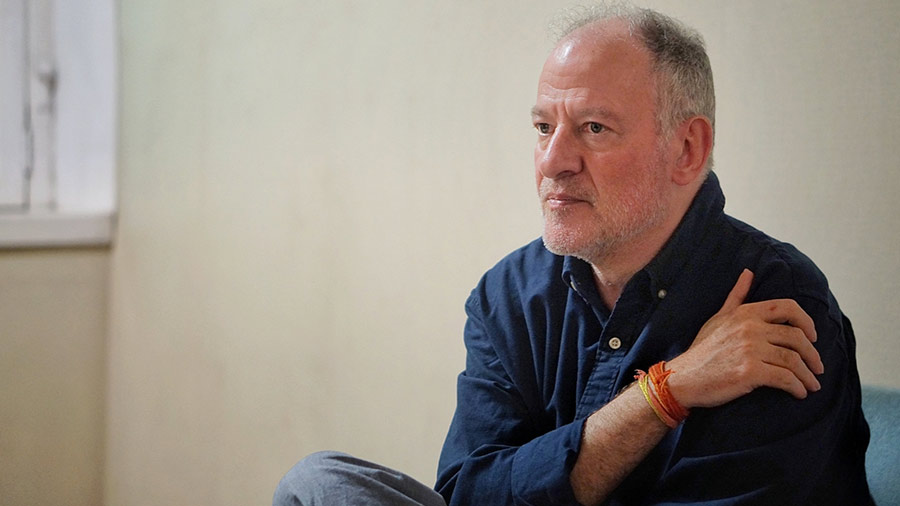When Jean-Claude Perrier, a veteran French author and journalist, first set foot in India, Indira Gandhi was the Prime Minister, India was yet to win a single cricket World Cup and Kalki Koechlin was yet to be born. Today, India is a second home for Perrier, a country which has inspired three of his books, the latest of which is Like Barbarians in India (published in India in English by Niyogi Books).
Translated into English from French by Sriparna Chatterjee, the book is Perrier’s ode to India, combining his personal reflections on the country and its people with a thorough analysis of how four acclaimed French writers and intellectuals — Pierre Loti, Henri Michaux, Andre Malraux and Andre Gide — conceptualised and experienced India.
At the Kolkata launch of his book at Alliance Francaise du Bengale, My Kolkata caught up with Perrier to take a deep dive into his journey in India, what he makes of Kolkata, his friendship with the late Ravi Shankar and more.
My Kolkata: Why the title, Like Barbarians in India? Is this a deliberate adaptation of Henri Michaux’s A Barbarian in Asia?
Jean-Claude Perrier: Yes, it’s inspired by Michaux’s work, A Barbarian in Asia, which dedicates a hundred pages or so to India in a chapter called ‘A Barbarian in India’. Michaux had written in that chapter that “India sings, never forget that India sings”, alluding to the country’s culture of music. For me, the title of my book is an ironic wink at Michaux, not only to acknowledge everything he said about Indian culture, but also to underline the point that as a Westerner, I’m essentially a barbarian in a place like India. It’s a country that’s huge, diverse and complicated. Someone like myself can only understand some parts of the puzzle that is India. Which is why I always discover something new in India everytime I visit.
‘Malraux wanted to take to the battlefield for India at the age of 70!’
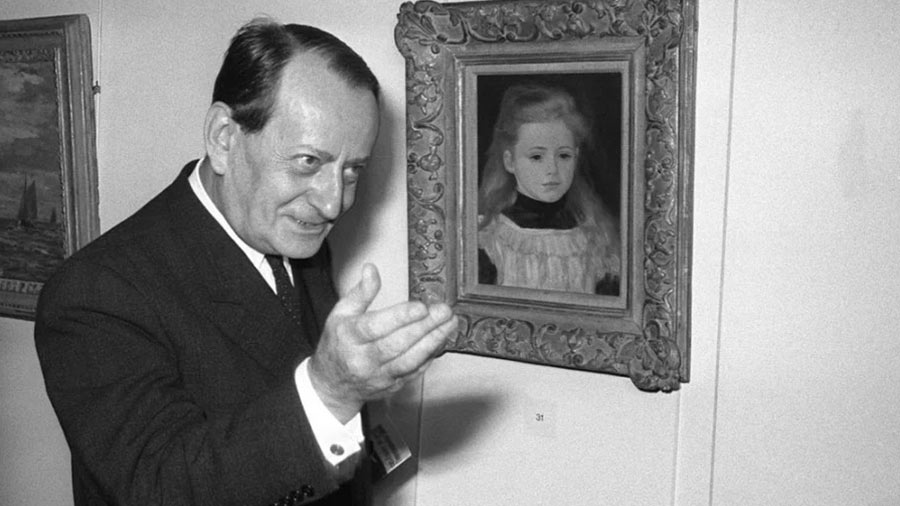
Andre Malraux influenced Perrier the most among the four French writers mentioned in the latter’s book
Could you briefly explain how each of the four authors in your book looked at India and contributed to the French understanding of India? Which of them had the deepest influence on you?
The deepest influence was definitely that of Malraux. Partly because his engagement with India was the longest. He first came to India in 1930, while his last trip was in 1974, two years before he passed away. His interactions with India went through multiple prisms, in keeping with the changing nature of his career. As a result, he experienced and documented India as a traveller, writer and minister. And then as a volunteer to fight for India (for the liberation of Bangladesh) during the Indo-Pak War of 1971. Malraux wanted to take to the battlefield for India at the age of 70! Obviously, the Indian government declined.
Among the others, Michaux wrote significantly about Indian music while Loti, who spent three months in India, made a number of insightful comparisons between north and south India. In an intriguing counterfactual narrative, he also imagined what India would’ve been like had it not been colonised by the British. Then there was Andre Gide, who never visited India, but was associated with Jawaharlal Nehru and ended up translating multiple works of Rabindranath Tagore, thus introducing a lot of French readers to the ideas of one of India’s greatest polymaths.
Running out of money in Delhi after a 15-day tour of India
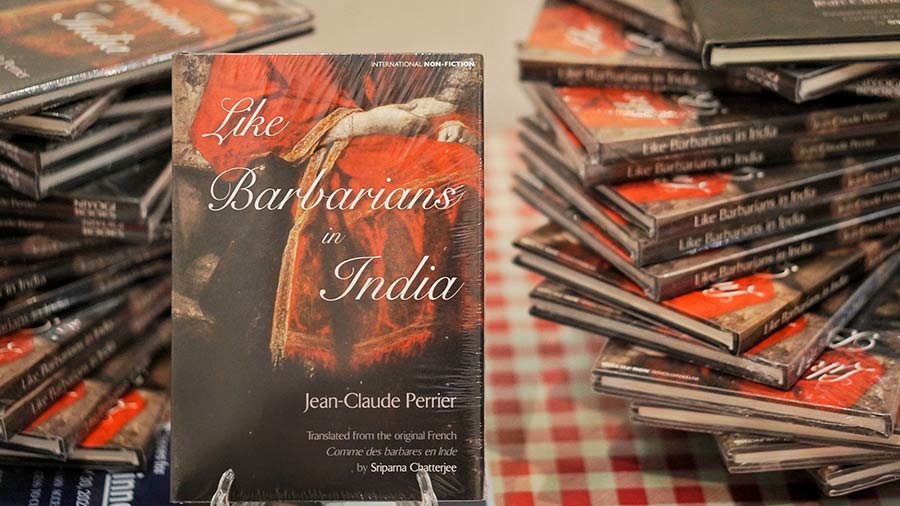
Perrier first came to India as a 24-year-old journalist on the recommendation of a friend
Tell us about your first visit to India in 1981. What are your fondest memories?
I came to India for a month on the recommendation of a friend who had visited the country prior to my arrival. I was 24 at the time, just starting out as a journalist in France. I remember landing at the Delhi airport, which was effectively a military airport back then. An airport official told me that since I wasn’t vaccinated for yellow fever, I couldn’t continue with my visit. Then I had to slip in $20 and was allowed to go through! I had a rough first night in Delhi, barely getting any sleep. The morning after I went to Alliance Francaise in the capital, where a 15-day trip was arranged for me. I saw several parts of India, including Kolkata. But once I came back to Delhi, I had run out of money. Luckily, Alliance Francaise needed someone to help teach French to a team of Indian corporate managers who were about to engage with Algerian clients. I stepped in for the role and sustained myself with the remuneration for the rest of my stay. At that point, if someone had told me that more than 40 years later, I’d still be coming back to India, I wouldn’t have believed them.
Over the decades, I’ve visited India dozens of times, building great relationships with several people. It’s the people of India that bring me back. Their warmth, their love and the connections I build with them. I’ve also hosted many of my Indian friends back in France and published some of their works in translation. Given the influence the country has had on me and that I’ve been coming to India for over 40 years, it’s fair to say that India has changed my life.
‘What I love best about Kolkata is the enthusiasm of the locals’
What have you made of your time in Kolkata over the years?
It’s always a pleasure coming to Kolkata. My first visit here (as part of the 1981 trip) was a bit chaotic, but the city has grown on me with time. In many ways, Kolkata hasn’t changed much, certainly not as much as Delhi. What I love best about Kolkata is the enthusiasm of the locals. Everytime I’m here, I’m inundated with people who want to talk to me about their shop or take me to a restaurant or show me around. That kind of energy is infectious.
‘Today, it’s impossible to do without India on this planet’
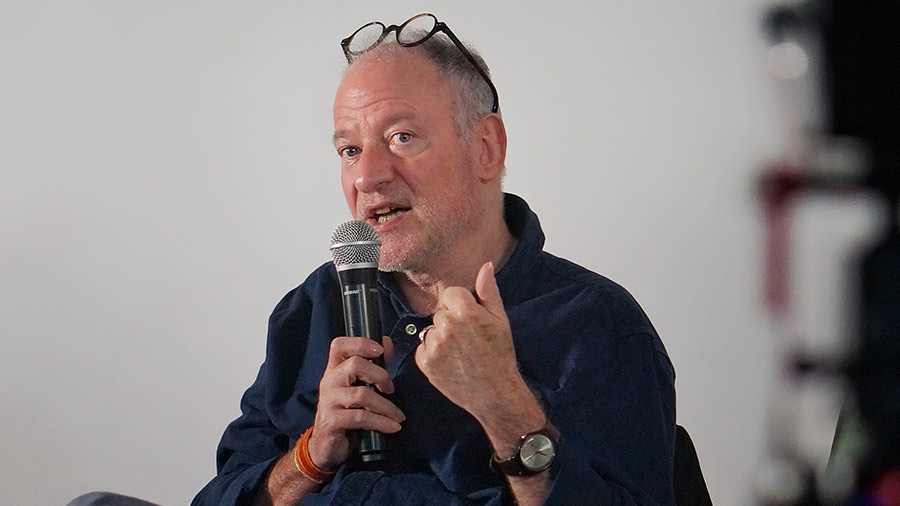
India’s strengths have always been its diversity, richness and syncretism, according to Perrier
How has India changed from your perspective across these four decades?
At one level, the changes are obvious. Better roads, hotels, cars, and all that. It’s far more comfortable visiting India these days. But the bigger change is the fact that India is growing on the international stage. In the ’80s, India was mostly inward-looking, it used to speak about India to Indians. Today, it’s impossible to do without India on this planet. The centre of the world is moving from the West to the East and India is in the middle of that transition. India’s legacy of non-alignment has allowed it to maintain harmonious relations with a lot of other stakeholders, which will be vital in the coming years. India’s strengths have always been its diversity, richness and syncretism, which together make up its civilisational spirit. As Malraux said: “India is the only civilisation built on spirituality.” I hope India continues to be that way and retains its values.
‘Ravi Shankar and I hit it off instantly, owing in no small part to our similar sense of humour’
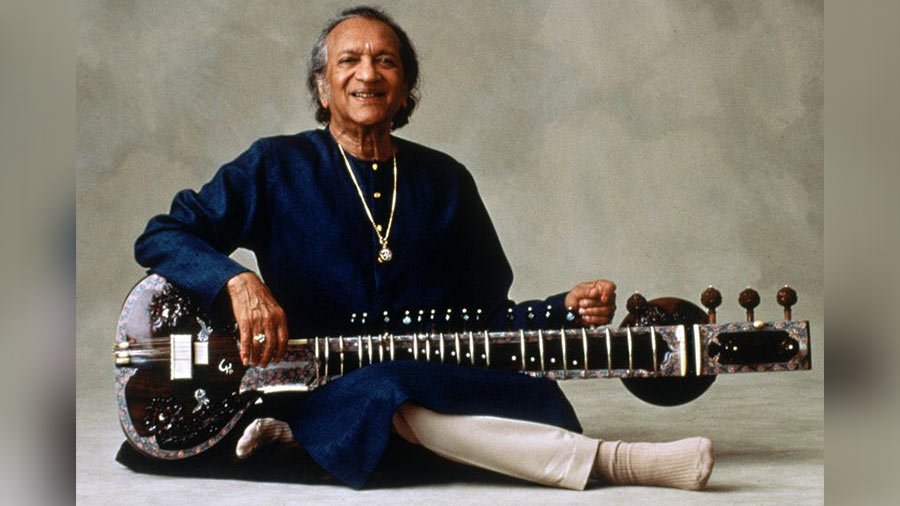
Ravi Shankar and Perrier came to know each other in the mid 2000s and developed a close friendship
On a different note, you were good friends with the maestro Ravi Shankar. What was that friendship like?
I’m a big fan of Indian music and have loved Ravi Shankar’s work ever since I was introduced to it. In 2005, I translated Anoushka Shankar’s book on her father, Bapi, The Love of My Life, into French, and it was sometime after that I ended up meeting Ravi in India through a mutual friend. We hit it off instantly, owing in no small part to our similar sense of humour. He’s extremely humble and loves France, having performed there first as a teenager back in the 1930s. We’d meet almost every year, either in France or in India. His death was a big personal loss for me.
My Kolkata also spoke to Chatterjee, a former French tutor at Alliance Francaise du Bengale and a distinguished city-based translator who helped make Perrier’s work accessible to English readers
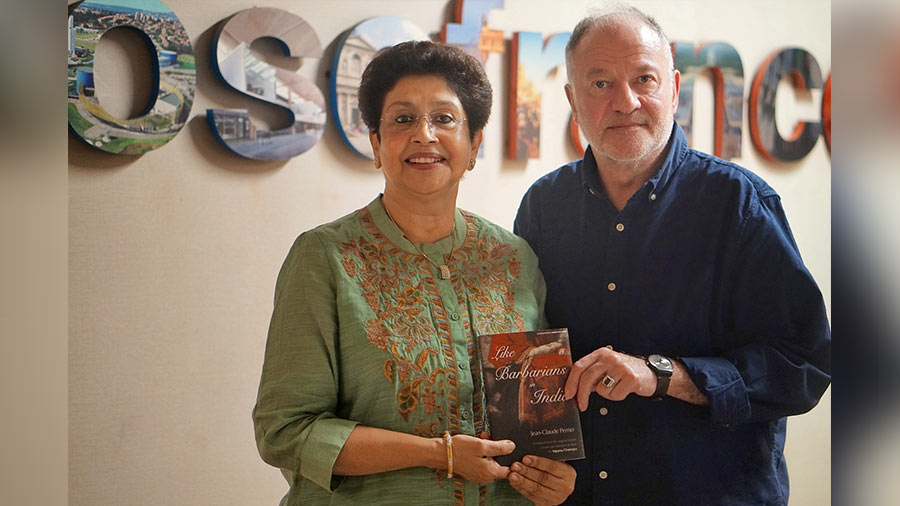
Perrier with Sriparna Chatterjee (left), who translated ‘Like Barbarians in India’ into English
How long did the translation process take and what were the biggest challenges?
It took around four months to complete. In terms of challenges, a non-fiction book is very different from translating something like Ghosts of Calcutta (by Sebastien Ortiz), a novel, which I had worked on in 2015. I wanted to retain as much of the author’s voice as possible as well as his style. This isn’t a work of transcreation. Every chapter is definitely translated in its entirety, but while translating from one language to another, it can't be done word for word. The sentence construction in every language is different, so it must be kept in mind that the translated version has to be readable in English and appeal to the English reader. Every time I completed translating a paragraph, I compared it again and again with the original to make sure that there was nothing that was "lost in translation".
Were you communicating with the author during the translation process?
Ironically, this is the first time we’re interacting (at Alliance Francaise du Bengale). In person or otherwise. There were stages during the translation process when I wanted to reach out to Jean-Claude to clarify a few things, but I eventually took care of those queries through my online research.
Which of the French writers mentioned in the book appealed to you the most?
For me, it was Loti. Largely because I didn’t know much about him prior to taking up the translation. Finding out about him was compelling. The way Jean-Claude has integrated the perspectives of all four writers is commendable, but Loti stood out for me.
As someone who has taught French in Kolkata for decades, how has the demand for learning the language evolved in recent times?
French is still an extremely popular foreign language to learn. But relative to other languages, there’s also a lot of demand for Spanish nowadays. Back when I started teaching French, it was mostly French, German and Chinese that Kolkatanas wanted to learn. But Spanish has more than caught up now.
Your favourite memory or aspect of France.
I’ve been to France many times, and I love the country and its culture. Spending time in Provence is my favourite.
